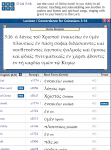.
Originally Posted by BibleGuy
13. You wrote: “The instructions about how to enter into and stay in covenant with God are quite different from the Abrahamic to the Sinaitic to the New Covenants.”
My response: All the covenants (plural! Eph. 2:12) are still in force. No Torah from any of the covenants has been terminated. We participate in these covenants. Thus, we OBEY the Torah of the covenants in which we participate.
First, let's see what Eph. 2:12 actually says. You have this habit of throwing out references without showing what they say, claiming that they support your assertion, when they don't even come close!
12 remember that at that time you were separate from Christ, excluded from citizenship in Israel and foreigners to the covenants of the promise, without hope and without God in the world.
That passage does not say that all covenants are still in effect - it just doesn't. What it does say is that Gentiles, at that time, were without Christ (because He had not yet done the Work of the Cross, in context), and that since they were not Israel they did not have citizenship with Israel and were foreigners to the covenant with Israel - without hope! But keep reading! This gets really good!
13 But now in Christ Jesus you who once were far away have been brought near by the blood of Christ.
THAT is the mystery of the Gospel! Not that Gentiles become Israel to participate in the Old Covenant, but that the Blood of Christ brings them into the New Covenant by faith in Christ! They become one Body in Christ! Keep reading, it gets even BETTER!
4 In reading this, then, you will be able to understand my insight into the mystery of Christ, 5 which was not made known to people in other generations as it has now been revealed by the Spirit to God’s holy apostles and prophets. 6 This mystery is that through the gospel the Gentiles are heirs together with Israel, members together of one body, and sharers together in the promise in Christ Jesus.
7 I became a servant of this gospel by the gift of God’s grace given me through the working of his power. 8 Although I am less than the least of all the Lord’s people,this grace was given me: to preach to the Gentiles the boundless riches of Christ, 9 and to make plain to everyone the administration of this mystery, which for ages past was kept hidden in God, who created all things.
10 His intent was that now, through the church, the manifold wisdom of God should be made known to the rulers and authorities in the heavenly realms, 11 according to his eternal purpose that he accomplished in Christ Jesus our Lord. 12 In him and through faith in him we may approach God with freedom and confidence. (from Eph. 3)
The Abrahamic and New Covenants are still in force, though the Abrahamic finds its full fulfillment in the New Covenant. The Old Covenant, according to Scripture, is now obsolete in Christ. This is a point already mostly addressed; folks can scroll down through the posts to see where.
I will add one thing here, however, and that is this in Galatians 3 -
15 Brothers and sisters, let me take an example from everyday life. Just as no one can set aside or add to a human covenant that has been duly established, so it is in this case. 16 The promises were spoken to Abraham and to his seed. Scripture does not say “and to seeds,” meaning many people, but “and to your seed,” meaning one person, who is Christ.
17 What I mean is this: The law, introduced 430 years later, does not set aside the covenant previously established by God and thus do away with the promise. 18 For if the inheritance depends on the law, then it no longer depends on the promise; but God in his grace gave it to Abraham through a promise.
And this, from Heb. 7 -
18 The former regulation is set aside because it was weak and useless 19 (for the law made nothing perfect), and a better hope is introduced, by which we draw near to God.
According to Scripture, the Law did not set aside the Abrahamic Covenant, but the New Covenant DID set aside the Law, the Old Covenant.
Let me put it this way: The New Covenant IS new for Israel - the Old had to be set aside. The New Covenant for Gentiles is the ONLY covenant by which we draw near to God (see the Ephesians passages above). The unconditional covenants given by God are still in effect - God both promises and fulfills those covenants - they are not dependent upon man at all. The Old Covenant is NOT an unconditional covenant, however, and because it was weak and useless (for the Law made nothing perfect), it has been set aside (see Heb. 7).
The Scriptures are not unclear on these facts.
-JGIG
119 Ministries presented: (they do make a lot of valid points)
Hebrews 7:12
Have you ever been told, the Law of God has changed?
It is different now.
It is not the same yesterday, today, and forever.
This verse is often cited:
Hebrews 7:12
For when there is a change (metatíthēmi) in the priesthood, there is necessarily a change (metáthesis) in the law as well.
The word for "change" as in “change of priesthood” and also "change of law" means "transfer" in the Greek.
It simply means that because the priesthood is transferred to the order of Melchizedek through our Messiah then the law must transfer to His administration as well.
So, same law, different administration.
If one reads the context of the surrounding text, this can be better understood.
It also helps to better understand the Greek definitions of the words translated as “change.”
The first, primary definition from Strong’s says it precisely.
"metatíthēmi / metáthesis"
First Primary Definition from Strongs:
"transfer: from one place to another"
There is a big difference in saying that the law is different versus simply transferred.
For example:
If a car is transferred from a car dealer in New York to a car dealer in California, the car is exactly the same, but simply in a different administration.
Did the car change?
No
The car was transferred.
When the administration of the priesthood was transferred in Messiah, the transfer of the law was transferred to that priesthood.
The Heavenly priesthood has always existed.
YHWH built into His law the right to administrate a priesthood on Earth as well.
The Heavenly always trumps the Earthly, as the Heavenly is perfect and the higher order...and the Earthly is only a reflection of the true image in the Heavens. This is what Hebrews goes on to say as well. (Exodus 25:40; Hebrews 8:5; Revelation 11:19).
Again...still the same law...
…new covenant, but same law.
Only four chapters later, the author of Hebrews uses the SAME Greek word in referring to Enoch:
Hebrews 11:5
By faith Enoch was taken up (metatithēmi) so that he should not see death, and he was not found, because God had taken him. Now before he was taken he was commended as having pleased God.
Enoch was "transferred" up to the heavenlies.
Did YHWH "change out" Enoch and "replace him" with another Enoch?
No.
He was simply transferred, just as the law was transferred…not made different…not changed…but
transferred.
Some then might point to verse 18, seemingly stating that the law of God was worthless:
Hebrews 7:18
For on the one hand, a former commandment is set aside because of its weakness and uselessness (for the law made nothing perfect); but on the other hand, a better hope is introduced, through which we draw near to God.
The first thing to note is that this verse is referring to a particular instruction, or commandment, in the Torah, not the whole Torah, or Law, in of itself.
Some attempt to state that verse 18 is referring to the whole Torah, but that is not what is being said.
The commandment that is being set aside, is the commandment for the Levites to administrate the priesthood. That commandment is set aside, not replaced or abolished. It is set aside through the means of the destruction of the temple.
There is a difference between set aside, and abolished.
This means that the commandment of the Levitical system still exists, but it is not exercisable because of the destruction of the Temple, which was scheduled to occur a couple years after Hebrews was written.
The destruction of the temple was a curse, not a blessing. It was a punishment, not a gift (Matthew 23:38).
This occurred because fault was found with “them” not the law of God. We see this in the very next
chapter:
Hebrews 8:8
For he finds fault with them when he says:
“Behold, the days are coming, declares the Lord, when I will establish a new covenant with the house of Israel and with the house of Judah,
So, the Levitical system is set aside through the destruction of the Temple, and we have a new High Priest in the order of Melchizedek, our Messiah Yeshua (Jesus).
The priesthood was set aside because of weakness and uselessness because they were found to be at fault. The law did not make the Earthly priesthood perfect.
On the other hand, our Messiah is perfect, and He is our High Priest. He operates in the Heavenly Tabernacle, that is also perfect, not built with human hands (Hebrews 8:2).
So in summary, Hebrews 7:12 and 7:18 do not state that the Law of God changed. The law remains intact and unchanged.
What changed is that:
We have a new High Priest in the order of Melchizedek.
The Earthly temple is destroyed, setting aside the ability for the Levites to function as priests according to the commandment.
The Levites were found at fault, which merited the punishment of the destruction of the temple
We have a better hope and promises through Yeshua in the order of Melchizedek.



